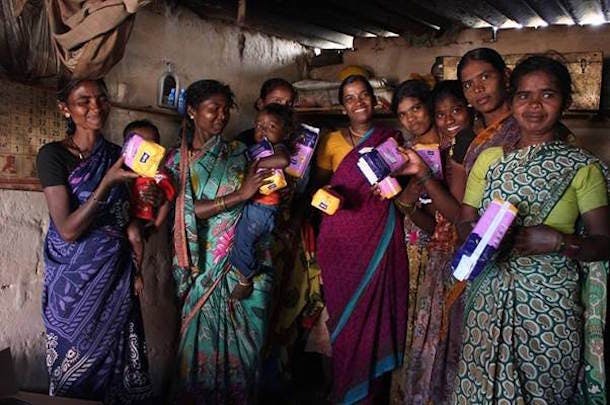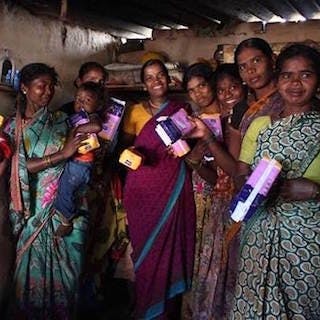Editor’s Note: This post is part of the blog series, “Her Goals: Our Future,” which highlights the connections between girls and women and the Sustainable Development Goals. Guest blogger views expressed here do not necessarily reflect the views of the UN Foundation.

Lakshmi, a mother of four, isn’t accustomed to talking about her periods. Living in a semi-nomadic community of migrants occupied in construction labor, she focuses solely on supporting her family. Like most women within the community, she used old rags or cloth to manage her cycle. As a rule of thumb, none of them talk about their periods. Her children – three of whom are daughters – were bound to take after her. For a family of seven that lived in a makeshift tent, sanitary napkins were an urban luxury. Now, as a micro-entrepreneur with Sukhibhava, a local social enterprise, Lakshmi can afford to give her daughters the key to something she didn’t have – the right to dignity and health.
The belief that menstruating women are impure, unholy, and dirty continues to negatively affect the lives of millions of Indian women. Only 12% of 350 million women between the ages of 12-45 have the means to afford sanitary towels. In urban India, around 58 million pads are thrown away each year leaving cities choked with non-biodegradable menstrual waste. Goonj, a pan-India social enterprise that recycles old, unused cloth to provide for poor women, reports that this is a growing concern.
But menstrual hygiene is more than a public health issue, the socio-economic consequences that women face is complex. Nearly 23% of girls drop out of school, some are forcefully married, and a worrying number of girls don’t use public toilets in fear of staining them. What’s worse, the lack of toilets hinders many from accessing sanitation when they need it most.
While many social enterprises focus on affordability and awareness, Sukhibhava is stepping in to place power in the hands of local women. After providing them with basic training, the organization buys pads from Bella, a sanitary provider, and provides stock on credit to women micro-entrepreneurs who sell it within their communities. The margin of profit they can make is motivation for many women to learn new business skills and earn a living while distributing sanitary pads in communities. The micro-entrepreneurs also use phones provided to them through which they continuously report, collect, and track progress within their own constituencies.
Through 18 micro-entrepreneurs, Sukhibhava is working directly with eight slum communities serving a population of 80,000 people in south Bangalore. So far, the organization has educated 12,000 women and reaches out to 7,200 every month. “It takes time to change behavior,” says Dilip Kumar, an Acumen fellow who founded the organization in 2013, adding, “It takes two or three times for women to respond positively.” In the next few years, Sukhibhava aims to scale its model to other Indian cities.
The growing trend of community-driven entrepreneurship is a positive sign for India’s economy. A UN report places India at 130 out of 155 countries on the Gender Inequality Index. The solution to fixing this gap lies in empowering women and girls.
Watch a video on Sukhibhava’s work here.
By Meera Vijayann, who writes on gender rights and social development in South Asia
[Photo: Sukhibhava]

